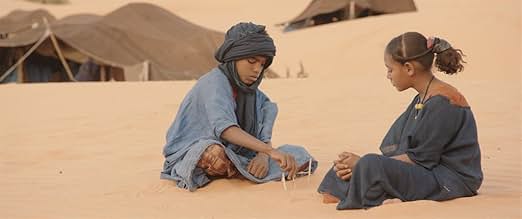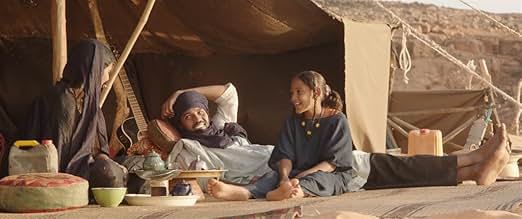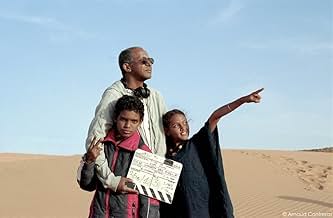PUNTUACIÓN EN IMDb
7,1/10
19 mil
TU PUNTUACIÓN
Un pastor y su familia residen en las dunas de Tombuctú. Sus tranquilas vidas - normalmente libres de jihadistas determinados en controlar su fe - se ven repentinamente trastornadas.Un pastor y su familia residen en las dunas de Tombuctú. Sus tranquilas vidas - normalmente libres de jihadistas determinados en controlar su fe - se ven repentinamente trastornadas.Un pastor y su familia residen en las dunas de Tombuctú. Sus tranquilas vidas - normalmente libres de jihadistas determinados en controlar su fe - se ven repentinamente trastornadas.
- Dirección
- Guión
- Reparto principal
- Nominado para 1 premio Óscar
- 33 premios y 28 nominaciones en total
Ibrahim Ahmed
- Kidane
- (as Ibrahim Ahmed dit Pino)
Yoro Diakité
- Djihadiste
- (as Yoro Diakite)
Weli Kleïb
- Juge
- (as Weli Cleib)
Reseñas destacadas
In the middle of the beauty of Saharian Africa, a shepherd and his lovely wife have to face the punishment of jihad's authorities in Timbuctu, a town in Mali. Religious authorities control even the most intimate gestures in the middle of crude poverty. A moral dictator, as usual conducts himself in double standard. Jihadism, persecutes not only sensual expressions such as the beauty of songs and music played by the people in the village, but also any expression of individuality. Amine Bouhafa's, music compositions are profoundly moving as also the sound of the original language, a soothing tender sound. The random of being born in such a place simply changes the life and options of the characters, leaving very little to free will.
"Let me say this loud and clear. There is a world of difference between terrorist acts and the Islamic Shari'a. Islam is not only a religion, but a way of life. And at its heart lie the sacred principles of tolerance and dialogue." King Hussein I
A popular cliché is to refer to "Timbuktu" as the farthest, out-of-it-all place on earth, like "You can go to Timbuktu for all I care." However, in writer/ director Abderrahmane Sissako's remarkable film, Timbuktu, the world rests in miniature in the sand dunes of gorgeous Mali, where a Bedouin family can languish in the shade of their tent while a small boy herds their cattle and nearby fishmongers ply their trade by a welcoming pond. It is a world seemingly removed from stress, a paradise.
In the cell-phone age, no one is too far away and paradise easily shattered, as the natives use their phones to coordinate their herds and their lives. So do the Muslim jihadists, who use their phones to control the natives, bending them to their will on such mundane matters as wearing gloves and playing music. In a way, the low-key policing by the jihadists employing Shari'a seems to contrast with the notorious ISIS, whose control extends to burning and beheading.
All is relatively tame until one Bedouin's pregnant cow is killed by a fishmonger, and the herder murders in revenge. The Long-distance wide-angle shot of the two men in a death struggle is remarkably beautiful and ominous, like David Lean's memorable Lawrence of Arabia scenes.
The local jihadist authority follows God's law in this case while it takes a woman into custody for not wearing gloves and carries out murderous punishment on musicians. This tranquil paradise slowly becomes a hotbed of repression while the director still shoots lovely scenes that belie the suppression already reaching into the lives that seemed so far removed.
Underneath the obvious meting out of "justice" is the subjugation of women, almost as if radical Muslim orthodoxy had this prejudice as its cornerstone. This film drives that oppression home as few others have done because it makes it a quiet but persistent issue in daily activity. The very peacefulness of the living in Mali and the sweet sparseness of the mise en scene could almost make us think the radicalism is acceptable. But when you see men buried in sand and rocks thrown at their heads, you know life in the sand in not romantic.
Timbuktu is rated PG-13, a triumph in good taste as murder and subjugation are the dominant activities. A film that allows young persons to see the world's injustices through a beautiful lens is a film worth sharing in the hope of removing radical Islamists from paradise. Let them have their virgins and soon.
A popular cliché is to refer to "Timbuktu" as the farthest, out-of-it-all place on earth, like "You can go to Timbuktu for all I care." However, in writer/ director Abderrahmane Sissako's remarkable film, Timbuktu, the world rests in miniature in the sand dunes of gorgeous Mali, where a Bedouin family can languish in the shade of their tent while a small boy herds their cattle and nearby fishmongers ply their trade by a welcoming pond. It is a world seemingly removed from stress, a paradise.
In the cell-phone age, no one is too far away and paradise easily shattered, as the natives use their phones to coordinate their herds and their lives. So do the Muslim jihadists, who use their phones to control the natives, bending them to their will on such mundane matters as wearing gloves and playing music. In a way, the low-key policing by the jihadists employing Shari'a seems to contrast with the notorious ISIS, whose control extends to burning and beheading.
All is relatively tame until one Bedouin's pregnant cow is killed by a fishmonger, and the herder murders in revenge. The Long-distance wide-angle shot of the two men in a death struggle is remarkably beautiful and ominous, like David Lean's memorable Lawrence of Arabia scenes.
The local jihadist authority follows God's law in this case while it takes a woman into custody for not wearing gloves and carries out murderous punishment on musicians. This tranquil paradise slowly becomes a hotbed of repression while the director still shoots lovely scenes that belie the suppression already reaching into the lives that seemed so far removed.
Underneath the obvious meting out of "justice" is the subjugation of women, almost as if radical Muslim orthodoxy had this prejudice as its cornerstone. This film drives that oppression home as few others have done because it makes it a quiet but persistent issue in daily activity. The very peacefulness of the living in Mali and the sweet sparseness of the mise en scene could almost make us think the radicalism is acceptable. But when you see men buried in sand and rocks thrown at their heads, you know life in the sand in not romantic.
Timbuktu is rated PG-13, a triumph in good taste as murder and subjugation are the dominant activities. A film that allows young persons to see the world's injustices through a beautiful lens is a film worth sharing in the hope of removing radical Islamists from paradise. Let them have their virgins and soon.
"Timbuktu" (2014 release from Mauritania; 99 min.) brings the story (fictional, by influenced by real events) of how the Mali town copes with the 'liberation' by jihadis. As the movie opens, we see the jihadis having a shooting practice by destroying the local wood statutes. The jihadis issue all kinds of rules ("smoking is forbidden! music is forbidden!"), much to the irritation of the local Mali population. We get to know one local family in particular, a husband and wife with their 12 yr. old daughter. They live a bit outside of the city center where the desert takes over, going about their daily business as best as possible. Then one day, one of the husband's cow accidentally destroys the fishing nets of the fisherman, who promptly kills the cow. The husband decides that he cannot tolerate this. To tell you more would spoil your viewing experience, you'll just have to see for yourself how it all plays out.
Couple of comments: first, it is a small miracle that a movie like "Timbuktu" could even have been made. Writer-director Abderrahmane Sissako shot the movie in Mauritania, which subs for Mali, but let's not kid ourselves. Mauritania is an "Islamic Republic", so it was no easy feat to shoot there either. Second, Sissako demonstrates again and again how much the local population resends the jihadis for uprooting their lives. There are several scenes in which a local man pleads with the jihadis ("where is forgiveness? where is leniency?"), to no avail of course. Playing soccer will cost you 20 leashes. Playing music comes at 40 lashes. Being in the room with someone from the opposite sex is another 40 lashes, and on and on. The fact that the neither side can understand the other (they speak Tamasheq in Timbuktu, the jihadis mostly speak Arabian, some also speak French or English) only makes the entire situation even more absurd. Second, while there are some shocking scenes in the movie, overall this is not a violent or graphic film. Almost on the contrary, in that the movie's editing and photography is done in such a way that it induces a false sense of peace and security. The photography in particular is pure eye-candy. Third, I have no idea where Sissako found these performers, but there are some wonderful performances, in particular from the wife and the 12 yr. old daughter. Bottom line: there is a good reason why this film is nominated for the Best Foreign Language Oscar, as it is a deeply moving film that will stay with you long after you have seen it.
The movie finally opened this weekend at my local art-house theater here in Cincinnati, and I went to see it right away. The matinée screening where I saw this at today was attended okay but not great, although I'm hoping that the bitter cold weather is a factor for that. If you like a top-notch foreign film that provides a glimpse of what real life under jihad is like, you cannot go wrong with this. "Timbuktu" is HIGHLY RECOMMENDED!
Couple of comments: first, it is a small miracle that a movie like "Timbuktu" could even have been made. Writer-director Abderrahmane Sissako shot the movie in Mauritania, which subs for Mali, but let's not kid ourselves. Mauritania is an "Islamic Republic", so it was no easy feat to shoot there either. Second, Sissako demonstrates again and again how much the local population resends the jihadis for uprooting their lives. There are several scenes in which a local man pleads with the jihadis ("where is forgiveness? where is leniency?"), to no avail of course. Playing soccer will cost you 20 leashes. Playing music comes at 40 lashes. Being in the room with someone from the opposite sex is another 40 lashes, and on and on. The fact that the neither side can understand the other (they speak Tamasheq in Timbuktu, the jihadis mostly speak Arabian, some also speak French or English) only makes the entire situation even more absurd. Second, while there are some shocking scenes in the movie, overall this is not a violent or graphic film. Almost on the contrary, in that the movie's editing and photography is done in such a way that it induces a false sense of peace and security. The photography in particular is pure eye-candy. Third, I have no idea where Sissako found these performers, but there are some wonderful performances, in particular from the wife and the 12 yr. old daughter. Bottom line: there is a good reason why this film is nominated for the Best Foreign Language Oscar, as it is a deeply moving film that will stay with you long after you have seen it.
The movie finally opened this weekend at my local art-house theater here in Cincinnati, and I went to see it right away. The matinée screening where I saw this at today was attended okay but not great, although I'm hoping that the bitter cold weather is a factor for that. If you like a top-notch foreign film that provides a glimpse of what real life under jihad is like, you cannot go wrong with this. "Timbuktu" is HIGHLY RECOMMENDED!
At the end of Woody Allen's Bananas, the leader of the successful Latin American revolution starts making crazed pronouncements: "The official language of the country will be Swedish! Everyone must change their underwear every day, and wear it on the outside so we can check!" That's kind of what happens when the jihadists come to town in Timbuktu, only its tragic, not funny. A bunch of mostly foreigners with AK-47s show up in a Muslim community, tell all the locals they're not Muslim enough, and oh, by the way, use the Qaran to justify taking anything they feel like taking, including marriageable young women. You come away with a sense of what it feels like for ordinary people to live through this, and it's not pretty at all.
On April 1, 2012, the National Movement for the Liberation of Azawad (MNLA) and the Al Qaeda linked Ansar Dine, took over Timbuktu in the African country of Mali, and placed it under Sharia law. Director Abderrahmane Sissako was born in his mother's country of Mauritania, but spent most of his life in Mali, his father's place of birth. Sissako's main goal in "Timbuktu," is to expose both the harsh rule of the Jihadists along with their hypocrisy.
Sissako begins his story with images of Africa animist statutes being machine-gunned (off screen) by the newly minted oppressors of Timbuktu. Sissako's Jihadists are not simply one-dimensional villains. The leader of the lot, Abdelkrim, hails from Libya and must utilize an interpreter to communicate his harsh vision of Islam. Despite his puritanical orders, Abdelkrim is not averse to talking shop about soccer (which is banned in the city) as well as smoking cigarettes.
Abdelkrim soon realizes that his local conscripts aren't as enthusiastic about Jihad than he is. He attempts to coach one of his local soldiers to fashion a propaganda message before a video camera but the young man just doesn't seem to be able to say things like he means it.
While the Jihadists drive around in SUV's with machine guns slung over their shoulders, the administration of Sharia law proceeds at a snail's pace. This is probably due to the slow paced nature of life in that part of the world to begin with. I was expecting brutal large scale massacres along the lines of ISIS in Syria or Iraq, but most of the jihadists' violent actions are selective: a woman receives lashes for singing and a couple is stoned to death for committing adultery.
Sissako doesn't focus a great deal of time in fleshing out his victims, although a couple of his characters hit the mark: the odd but interesting Haitian female shaman who isn't afraid to thumb her nose at her oppressors as well as a local Iman who attempts to reason with the jihadists over one of their soldiers taking a young girl as his bride against her wishes.
Sissako's main character who constitutes the main part of the narrative is Kidane, a local herder who lives out in the countryside with his wife and daughter. As A. O. Scott argues, "He is a symbol of decency and tolerance, of everything the extremists want to destroy, precisely because he is an intriguing, fully rendered individual." I'm not sure if I agree with Mr. Scott that Kidane is "full rendered," as Mr. Sissako goes out of his way to emphasize the character's saintliness a little too often (yes we do come to realize that Kidane's daughter does mean just about everything to him).
Kidane does have an Achilles heel and Sissako perhaps suggests that Kihane's thirst for revenge may be endemic in the culture. After a local fisherman kills one of his prize cows, Kihane goes to "talk" to him, carrying a gun (his wife warns him not to carry the gun, but he ignores her). Sure enough, the argument between the two turns into a killing-whether the shot that was fired occurred during the struggle or was intentional-is unclear. Kihane ends up before the Jihadi court but probably would have ended up in the same situation, no matter who was administering justice.
Some critics have suggested that Sissako's style is akin to Brecht. Certainly a good part of his strategy is to make his audience aware of social injustice and exploitation in a part of the world most westerners are not familiar with. If some of his characters seem a bit sketchy, that's because Sissako has fashioned more of a fable than docudrama. Under the veneer of Sissako's tragic landscape, the clarion call for freedom continues to resonate.
Sissako begins his story with images of Africa animist statutes being machine-gunned (off screen) by the newly minted oppressors of Timbuktu. Sissako's Jihadists are not simply one-dimensional villains. The leader of the lot, Abdelkrim, hails from Libya and must utilize an interpreter to communicate his harsh vision of Islam. Despite his puritanical orders, Abdelkrim is not averse to talking shop about soccer (which is banned in the city) as well as smoking cigarettes.
Abdelkrim soon realizes that his local conscripts aren't as enthusiastic about Jihad than he is. He attempts to coach one of his local soldiers to fashion a propaganda message before a video camera but the young man just doesn't seem to be able to say things like he means it.
While the Jihadists drive around in SUV's with machine guns slung over their shoulders, the administration of Sharia law proceeds at a snail's pace. This is probably due to the slow paced nature of life in that part of the world to begin with. I was expecting brutal large scale massacres along the lines of ISIS in Syria or Iraq, but most of the jihadists' violent actions are selective: a woman receives lashes for singing and a couple is stoned to death for committing adultery.
Sissako doesn't focus a great deal of time in fleshing out his victims, although a couple of his characters hit the mark: the odd but interesting Haitian female shaman who isn't afraid to thumb her nose at her oppressors as well as a local Iman who attempts to reason with the jihadists over one of their soldiers taking a young girl as his bride against her wishes.
Sissako's main character who constitutes the main part of the narrative is Kidane, a local herder who lives out in the countryside with his wife and daughter. As A. O. Scott argues, "He is a symbol of decency and tolerance, of everything the extremists want to destroy, precisely because he is an intriguing, fully rendered individual." I'm not sure if I agree with Mr. Scott that Kidane is "full rendered," as Mr. Sissako goes out of his way to emphasize the character's saintliness a little too often (yes we do come to realize that Kidane's daughter does mean just about everything to him).
Kidane does have an Achilles heel and Sissako perhaps suggests that Kihane's thirst for revenge may be endemic in the culture. After a local fisherman kills one of his prize cows, Kihane goes to "talk" to him, carrying a gun (his wife warns him not to carry the gun, but he ignores her). Sure enough, the argument between the two turns into a killing-whether the shot that was fired occurred during the struggle or was intentional-is unclear. Kihane ends up before the Jihadi court but probably would have ended up in the same situation, no matter who was administering justice.
Some critics have suggested that Sissako's style is akin to Brecht. Certainly a good part of his strategy is to make his audience aware of social injustice and exploitation in a part of the world most westerners are not familiar with. If some of his characters seem a bit sketchy, that's because Sissako has fashioned more of a fable than docudrama. Under the veneer of Sissako's tragic landscape, the clarion call for freedom continues to resonate.
¿Sabías que...?
- CuriosidadesThe scene in which the cow was killed with a spear was done by sedating the cow under the supervision of a veterinarian and adding the spear digitally in post production - the animal was not harmed.
- PifiasIn the stoning scene, both man and woman are buried up to their necks. In a proper Islamic stoning (rajm), the woman should only be buried up to her waist.
- ConexionesFeatured in The Oscars (2015)
- Banda sonoraShooting The Statues
Composed, Arranged and Orchestrated By Amin Bouhafa
with The City of Prague Philharmonic Orchestra
© 2014 Universal Music France
Selecciones populares
Inicia sesión para calificar y añadir a tu lista para recibir recomendaciones personalizadas
- How long is Timbuktu?Con tecnología de Alexa
Detalles
- Fecha de lanzamiento
- Países de origen
- Sitios oficiales
- Idiomas
- Títulos en diferentes países
- Timbuktú
- Localizaciones del rodaje
- Oualata, Mauritania(as Timbuktu)
- Empresas productoras
- Ver más compañías en los créditos en IMDbPro
Taquilla
- Recaudación en Estados Unidos y Canadá
- 1.076.075 US$
- Fin de semana de estreno en EE. UU. y Canadá
- 45.110 US$
- 1 feb 2015
- Recaudación en todo el mundo
- 7.179.391 US$
- Duración1 hora 36 minutos
- Color
- Relación de aspecto
- 2.35 : 1
Contribuir a esta página
Sugerir un cambio o añadir el contenido que falta

Principal laguna de datos
By what name was Timbuktu (2014) officially released in India in English?
Responde













